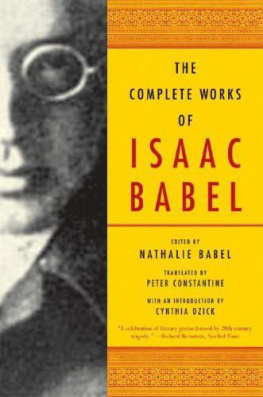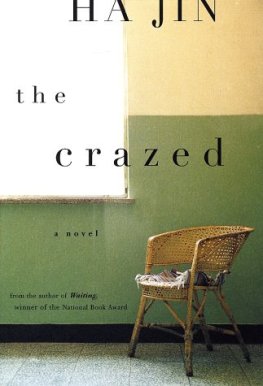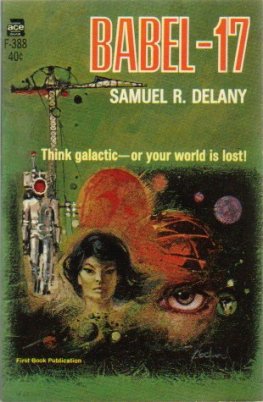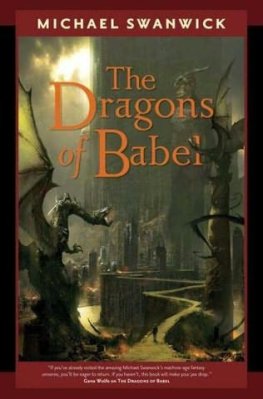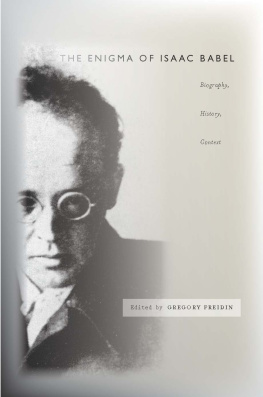INTRODUCTION
by Cynthia Ozick
On May 15, 1939, Isaac Babel, a writer whose distinction had earned him the Soviet privilege of a dacha in the country, was arrested at Peredelkino and taken to Moscows Lubyanka prison, headquarters of the secret police. His papers were confiscated and destroyedamong them half-completed stories, plays, film scripts, translations. Six months later, after three days and nights of hellish interrogation, he confessed to a false charge of espionage. The following year, a clandestine trial was briefly held in the dying hours of January 26; Babel recanted his confession, appealed to his innocence, and at 1:40 the next morning was summarily shot by a firing squad. He was forty-five. His final plea was not for himself, but for the power and truth of literature: Let me finish my work.
What Kafkas art hallucinatestrial without cause, an inescapable predicament directed by an irrational force, a malignant social order Babel is at last condemned to endure in the living flesh. Kafka and Babel can be said to be the twentieth centurys European coordinates: they are separated by language, style, and temperament; but where their fevers intersect lies the point of infection. Each was an acutely conscious Jew. Each witnessed a pogrom while still very young, Kafka in enlightened Prague, Babel under a Czarist regime that promoted harsh legal disabilities for Jews. Each invented a type of literary modernism, becoming a movement in himself, indelible, with no possibility of successors. To be influenced by Kafka is to end in parody; and because the wilderness of an astoundingly variegated experience is incised, unduplicatably, in the sinews of Babels prose, no writer can effectively claim to be his disciple.
But of course they are opposites: Kafka ingrown, self-dissatisfied, indifferent to politics; hardly daring, despite genius, to feel entitlement to his own language; endlessly agonizing over a broken engagement; rarely leaving home. And here is Babel, insouciant, reckless, a womanizer, half a vagabond, a horseman, a propagandist, the father of three by three different women, only one of them legally his wife. Then why bring up Kafka when speaking of Babel? Kafka at least died in his bed. Babel was murdered by the criminal agency of a cynically criminal government. Kafka requested that his writing be destroyed, and was not obeyed. Babels name and work were erasedas if he had never written at alluntil 1954, when, during a thaw, he was, in Soviet terminology, rehabilitated.
Yet taken together, they tell us what we in our time are obliged to know about the brutal tracings of force and deception, including self-deception. Kafka alone is not enough; his interiors are too circumscribed. Babel alone is not enough; his landscapes are too diffuse. Kafka supplies the grandly exegetical metaphor: the man who thinks but barely lives, the metaphysician who is ultimately consumed by a conflagration of lies. Babel, by contrast, lives, lives, lives! He lives robustly, inquisitively, hungrily; his appetite for unpredictable human impulse is gargantuan, inclusive, eccentric. He is trickster, rapscallion, ironist, wayward lover, imprudent impostorand out of these hundred fiery selves insidious truths creep out, one by one, in a face, in the color of the sky, in a patch of mud, in a word. Violence, pity, comedy, illumination. It is as if he is an irritable membrane, subject to every creaturely vibration.
Babel was born in Odessa, a cosmopolitan and polyglot city that looked to the sea and beyond. It was, he wrote, the most charming city of the Russian Empire. If you think about it, it is a town in which you can live free and easy. Half the population is made up of Jews, and Jews are a people who have learned a few simple truths along the way. Jews get married so as not to be alone, love so as to live through the centuries, save money so they can buy houses and give their wives astrakhan jackets, love children because, lets face it, it is good and important to love ones children.The poor Odessa Jews get very confused when it comes to officials and regulations, but it isnt all that easy to get them to budge in their opinions, their very antiquated opinions. You might not be able to budge these Jews, but theres a whole lot you can learn from them. To a large extent it is because of them that Odessa has this light and easy atmosphere.
There is much of the affectionate and mirthful Babel in this paragraph: the honest yet ironic delight in people exactly as they are, the teasing sense of laughing entitlement (so as to live through the centuries), prosperity and poverty rubbing elbows, ordinary folk harried by officialdom, confusion and stubbornness, love and loneliness. As for poor Jews, Babel began as one of these, starting life in the Moldavanka, a mixed neighborhood with a sprinkling of mobsters. What he witnessed there, with a bright boys perceptiveness, catapulted him early on into the capacious worldliness that burst out (he was twenty-nine) in the exuberant tales of Benya Krik and his gangtough but honorable criminals with a Damon Runyonesque strain.
Lionel Trilling, among the first to write seriously about Babel in English, mistook him for a Jew of the ghetto. If ghetto implies a narrow and inbred psyche, then Babel stands for the reverse. Though he was at home in Yiddish and Hebrew, and was familiar with the traditional texts and their demanding commentaries, he added to these a lifelong infatuation with Maupassant and Flaubert. His first stories were composed in fluent literary French. The breadth and scope of his social compass enabled him to see through the eyes of peasants, soldiers, priests, rabbis, children, artists, actors, women of all classes. He befriended whores, cabdrivers, jockeys; he knew what it was to be penniless, to live on the edge and off the beaten track. He was at once a poet of the city (the glass sun of Petersburg) and a lyricist of the countryside (the walls of sunset collapsing into the sky). He was drawn to spaciousness and elasticity, optimism and opportunity, and it was through these visionary seductions of societal freedom, expressed politically, that he welcomed the Revolution.
He not only welcomed it; he joined it. In order to be near Maxim Gorky, his literary hero, Babel had been living illegally in St. Petersburg, one of the cities prohibited to Jews under the hobbling restrictions of the Czarist Pale of Settlement. With the advent of the Revolution the Pale dissolved, discriminatory quotas ceased, censorship vanished, promises multiplied, and Babel zealously attached himself to the Bolshevik cause. In 1920, as a war correspondent riding with the Red Calvary to deliver Communist salvation to the reluctant Polish villages across the border, he fell into disenchantment. They all say they re fighting for justice and they all loot, he wrote in his diary. Murderers, its unbearable, baseness and crime.... Carnage. The military commander and I ride along the tracks, begging the men not to butcher the prisoners. Six years later, Babel published his penetrating-ly authoritative Red Cavalry stories, coolly steeped in pity and blood, and found instant fame.
With Stalins ascension in 1924, new tyrannies began to mimic the old. Postrevolutionary literary and artistic ferment, much of it experimental, ebbed or was suppressed. Censorship returned, sniffing after the subversive, favoring the coarse flatness of Socialist Realism. Babels wife, Evgenia, whom he had married in 1919, emigrated to Paris, where his daughter Nathalie was born in 1929. His mother and sister, also disaffected, left for Brussels. Babel clung to Moscow, hotly wed to his truest bride, the Russian tongue, continuing his work on a cycle of childhood stories and venturing into writing for theater and film. The film scripts, some designed for silent movies, turned out to be remarkable: they took on, under the irresistible magnetism of the witnessing camera and the innovation of the present tense, all the surreal splendor of Babels most plumaged prose. Several were produced and proved to be popular, but eventually they failed to meet Party guidelines, and the director of one of them, an adaptation of Turgenev, was compelled to apologize publicly.

